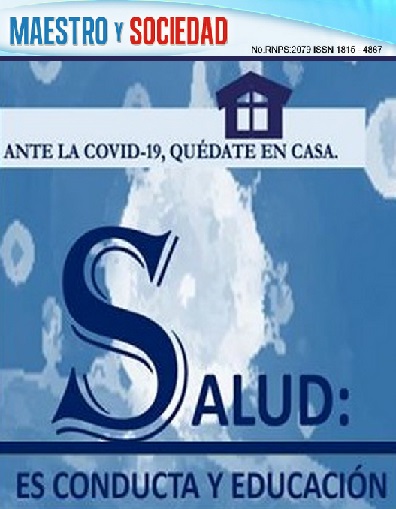Strategy for the formation of the investigative component in the students of the Higher Technician of the short cycle in the Nursing career
Array
Keywords:
strategy, student, investigativeAbstract
The nursing staff professional formation aimed at fomenting health and getting the physical and social well-being and to integrate teaching the services and investigation in such a way that if should permit to guarantee the quality of the professional practice in the medical sciences .This strategy groups the curricular ways proposed for the laboral and investigative formation of the students which at the same time will enable them the mastery of the TIC as well as it offers them the means for them to develop abilities that are required for the search of knowledge ,since in their first year they don't receive any subjects that helps them to carry out the book revision oriented in their syllabus it is centered on the discipline of informatics in health and nursing, principal integrating discipline and other subjects of the studying plan participate .
References
2. Bedriñana, J. R. (2013). El diseño e implementación de materiales didácticos digitales en las carreras de ingeniería en la modalidad semipresencial. (Tesis de maestría). Universidad de La Habana, La Habana, Cuba.
3. Beveridge, W. (1996). El arte de la investigación Científica. Caracas: Universidad Central de Venezuela.
4. Buendía-Arias, X. P., Zambrano-Castillo, L. C. y Alirio, E. (2018). El desarrollo de competencias Investigativas de los docentes en formación en el contexto de la práctica pedagógica. FOLIOS, (47), 179-195. Doi: https://doi.org/10.17227/folios.47-7405
5. Fernández, J. et al. (2013). Sistematización teórica de los principales resultados aportados en la investigación educativa y su introducción atendiendo a las características de estos. La Habana: Pueblo y Educación.
6. Herrero, E. (2006). Análisis del papel de los medios y las Tecnologías de la Información y las Comunicaciones (TIC) en el proceso de universalización de la enseñanza. En, S., Hourritenier P (coord.). La Nueva Universidad Cubana y su contribución a la universalización del conocimiento, (363-372). La Habana: Félix Varela.
7. Moscoso, F. y Hernández, A. (2015) La formación pedagógica del docente universitario: un reto del mundo contemporáneo. Revista Cubana de Educación Superior, 34(3), 140-154.
8. Núñez, N., Vigo, O., Palacios, P. y Arnao, M. (2014). Formación Universitaria Basada en Competencias: Currículo, Estrategias Didácticas y Evaluación. Chiclayo, Perú: FormatsPrint.
9. Ojalvo, V. (2013). El estudio de los valores en la Educación Superior cubana. Experiencias investigativas desde el Enfoque Histórico-Cultural. En Hernández, A. (coord.). Aportes del Enfoque Histórico Cultural a la educación: experiencias de su aplicación en la Universidad de La Habana. La Habana: FEDU.
10. Oropeza, M., Mena, A. y Soto, G. (2014). La formación y desarrollo de la competencia investigativa en docentes en ejercicio de la Benemérita Universidad Autónoma de Puebla. Revista de la Facultad de Derecho y Ciencias Sociales, 8(15), 43-59.
11. Reiban, R., De la Rosa, H. y Zevallos, J. (2017). Competencias investigativas en la Educación Superior. Revista Publicando, (1).
12. Vincenzi, A. (2012). La formación pedagógica del profesor universitario. Un desafío para la reflexión y revisión de la práctica docente en el nivel superior. Revista Aula, 18, 111-122. Recuperado de http://revistas.usal.es/index.php/0214-3402/article/download/8875/11800
Published
How to Cite
Issue
Section
License
This journal provides immediate open access to its content, based on the principle that offering the public free access to research helps a greater global exchange of knowledge. Each author is responsible for the content of each of their articles.



























 Universidad de Oriente
Universidad de Oriente 